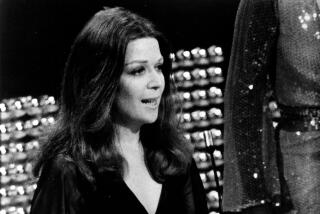‘Martin’ a Sitcom, Not Stereotype
- Share via
Woody Allen supposedly said: “Those who can, do. Those who can’t, teach. And those who can’t teach become entertainment critics.” In his Dec. 15 article, Howard Rosenberg proved he cannot even do the latter.
He begins the article (“A New Low on the Taste Meter,” Calendar) by saying “it’s always dicey” for a white man to comment on perceived stereotyping in a black television show, then immediately ignores his own advice and forges ahead. I guess as a liberal white he felt it was his civic responsibility to protect us “po’ black folk” from ourselves.
The focus of Rosenberg’s righteous indignation was a recent episode on the Fox show “Martin,” in which our two central characters, Martin and Gina, attempt to prove their true love for one another by going two weeks without having sex. Two African Americans who have been in a monogamous relationship for two years abstaining from sex to prove their love? My, but the racial stereotypes abound.
Admittedly the core of this episode is not a new idea for television. Years ago, in the Shelly Long era, Sam and Diane of “Cheers” tried to test their love in a similar fashion. However, instead of going for two weeks, it was a matter of minutes before they were writhing on a couch in the back room. It was cute, funny and perfectly acceptable for a “white” television program.
Therein lies the problem. As a young black writer, I am both dismayed by and tired of the double standard that is leveled against “black” television. What is considered acceptable behavior for sitcom whites is thought of as being buffoonish and stereotypical for sitcom blacks. While “Seinfeld” gets showered with Emmy nominations for a show about a masturbation contest, we are vilified for even testing the waters of sexual attraction. Once again Rosenberg has proven an ugly and age-old truth: There are some places that blacks, even on television, are not allowed to go.
Rosenberg climbs a tree to forbid blacks from dealing with sexuality in television. He brings in the Anita Hill case and notes that some African Americans accused her of perpetuating black sexual stereotypes for alleging that she had been sexually harassed by then-Supreme Court nominee Clarence Thomas. Rosenberg might just as well have blamed rape victims who report their attacks for perpetuating the stereotype of men thinking with their genitalia. Folding the Hill-Thomas case into the article was nothing less than irresponsible and a slight to women who have been sexually harassed or worse.
Certainly the episode in question was adult in nature, but it was David Grant’s failing, as overseer of Fox’s standards and practices department, for not compensating by airing the episode at a later time or with a parental warning.
The greater failing, of course, is Rosenberg’s, who insists on thinking of our characters as blacks rather than people (his use of the adjective primitive to describe that episode is indicative of his opinion of African Americans). As a rule sitcom characters, be they black, white (and hopefully one day Latino and Asian), are by nature outrageous. Are the incompetent Tim Allen of “Home Improvement” or the excitable and hyperbolic Kelsey Grammer of “Fraiser” an indictment of all whites? Hardly. Why is it then that any TV black who is not a Cosby kid is offensive?
If Rosenberg insists on categorizing, our show is populated by positive African American role models. All of our characters are employed, educated and live a comfortable, middle-class lifestyle. On “Martin” there are no welfare recipients, no single mothers, no absent fathers. What we do have--which no other prime-time TV show has--are two young, single blacks involved in a loving, ongoing, one-on-one relationship. That may be an urban reality that Rosenberg’s skewed liberal sensibility cannot accept, but if it is a negative stereotype then it’s one I wish every young black person could see more of on television and in real life.
The Dec. 15 article really comes as no surprise. Rosenberg has been anti-”Martin” from its inception, when he included our show in his list of the 10 worst new programs for the ‘92-’93 television season. Two years and “Martin” is not only a hit but the recipient of both an NAACP Image Award and a People’s Choice Award for best new sitcom. You were wrong then, Howard. You’re still wrong.
More to Read
The complete guide to home viewing
Get Screen Gab for everything about the TV shows and streaming movies everyone’s talking about.
You may occasionally receive promotional content from the Los Angeles Times.






